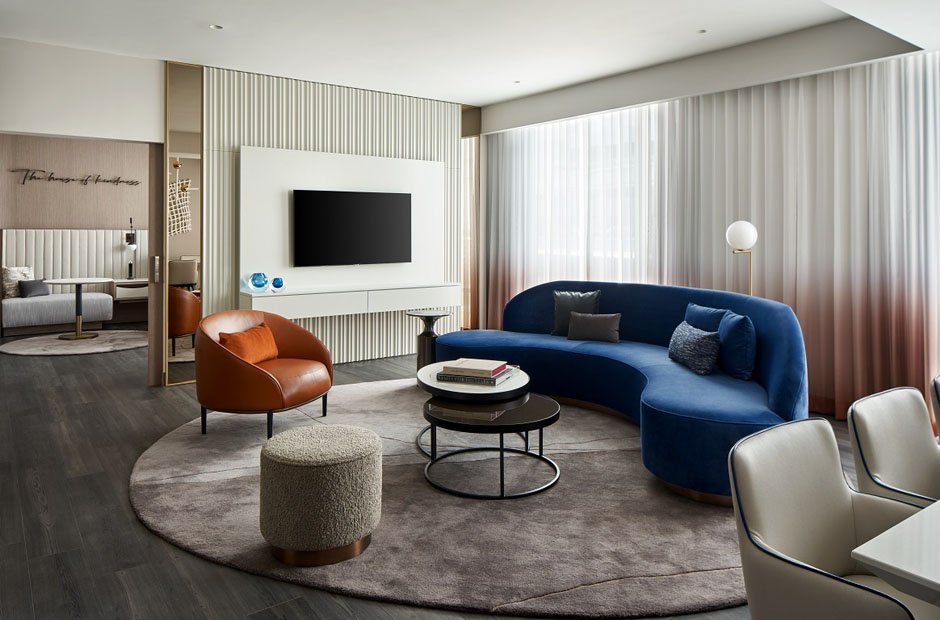Modern hotel suites have voice assistants as virtual concierges. Visitors can say “turn on the lights,” “lower the shades,” or “set the temperature to 72 degrees” and the room responds instantaneously. These systems go beyond basic controls to link with hotel operations, making requests for more towels, spa hours, and room service easy. For privacy, devices reset between stays and never retain account information, but are always ready for requests. This always-on, hands-free interface turns the room into a butler that provides comfort and information without touching.
AI Personalization and Smart Service
An AI system learns and predicts guest preferences behind every voice command and automated modification. The technology pre-configures the room with appropriate lighting scenarios, pillow varieties, and music playlists based on past visits and real-time interactions. Digital entertainment providers estimate viewing habits; hotel AI predicts comfort settings and service ideas. Chat-based assistants and in-app bots use natural language to book dinners, make restaurant recommendations, and book spa services 24/7. Backend machine-learning models optimize personnel deployment, automate check-in and check-out, and predict equipment failure. The combination of guest-facing intelligence and operational analytics improves service speed and relevancy.
IoT: Automating Comfort and Efficiency
Voice and AI connect to the physical world via IoT technology. Smart thermostats, adjustable lighting panels, mobile-enabled door locks, and occupancy sensors constantly connect with centralized control systems. Your desired climate and lighting are automatically set when you arrive, and sensors turn down HVAC and turn out lights when you leave, saving up to 30% on HVAC. Mobile keys and app controls allow contactless entry, and housekeeping schedules adjust to avoid interruptions—cleaning is initiated after checkout. Facility-side predictive-maintenance algorithms use air handler and plumbing sensor data to schedule repairs before failures. This networked device ecosystem improves guest comfort and energy efficiency.
Bringing It All Together
Voice, AI, and IoT form a self-learning environment. The AI layer orchestrates IoT devices instantly from a guest’s voice order. The AI monitors device usage and service interactions to improve its guest preferences knowledge. This cycle allows:
-
Hands-free convenience: Saying “Good evening” can change lighting, drapes, and climate without manual input. To request music, weather updates, or room service, guests communicate naturally like friends.
-
Tailored personalization: The technology adjusts perfume diffusers, TV channels, and thermostat settings for returning guests based on past data. The AI suggests local restaurants or customizes in-room dining menus based on dietary notes or trip specifics.
-
Energy efficiency: Occupancy detection and smart controls ensure no energy is wasted. Automated prompts within the room’s interface encourage eco-friendly choices—like reusing towels or adjusting water usage—through personalized nudges that align with the guest’s past behavior, enhancing sustainability without feeling intrusive.
Integrating dashboards lets staff monitor guest requirements and room status in real time to take immediate action. A guest’s in-app chat request for extra pillows alerts cleaning immediately. Before an interruption, maintenance personnel are sent if sensor data suggests an HVAC issue.
Looking Ahead
Next-generation deployments will integrate generative AI chatbots directly into room tablets and speech platforms for sophisticated, free-form discussions like itinerary planning and bedtime storytelling. International tourists will benefit from multilingual help, and wearable-device integration might let the room know when you arrive. As 5G networks spread, immersive activities like virtual tours of local attractions or live-streamed events will stream effortlessly into the room. AI-driven water-usage monitors will optimize shower pressure and bathroom fixtures, while solar-adaptive shades will maximize sunshine harvesting. In addition to digital services, robotic helpers can bring bags and check in quickly. Biometric and digital-wallet technology will speed entrance and payment, making the stay frictionless.
Voice, AI, and IoT are already changing guest expectations, and the next wave promises even more personalization, frictionless interaction, and operational efficiency, making the smart hotel room a sanctuary and high-tech marvel.



